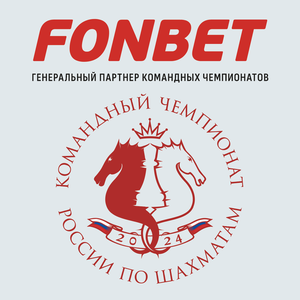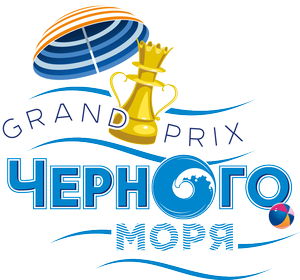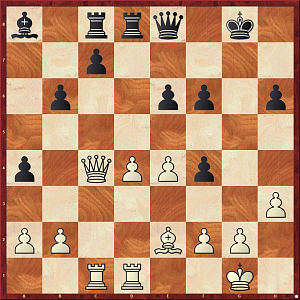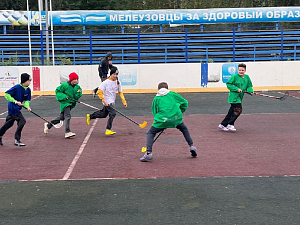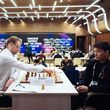22 June 2015
From East to West
Winners of the Russian Higher Leagues in the review of Dmitry Kryakvin.
We are very soon in for one of the most important venues of the Russian chess calendar, i.e. the Russian Chess Championship Higher League that will take place in Kaliningrad and which is going to define the qualifiers both in men’s and women’s sections for the Superfinal that is planned to be held in the city of Chita. In the past year the "Higher" event has held almost as far away as the easternmost point of our country, and now it has migrated over thousands of kilometers to the western borders. Has the turn now come for the South and the North?
The Russian Chess Federation has succeeded in increasing the prize fund of the competition, the venue is to be held in one of the most beautiful and ancient cities, and we are looking forward to getting plunged into the Kaliningrad battles as soon as possible! However, before we start talking about the upcoming events, it is not without interest to look back at the previous qualifiers and remember our heroes and heroines, whom we have no shortage of.
2004. The Qualifiers and the Superfinal
The idea of qualification into the Russian Chess Championship Superfinal to join the strongest players was first implemented in 2004. National grandmasters were fighting for qualification into the super-strong round robin, where they were supposed to join not only the best "national team players", but also the legendary "K"s. The way it happened, however, was that one "K" fell ill, another "K" turned out to be extremely busy, and it was only Garry Kasparov who was there for all the three of them and went on to successfully win the Super final. The seasoned Alexey Dreev and the young Alexander Motylev, who became the triumphant qualifier winners of the so-called Western and Eastern Higher Leagues, also went on to prove their mettle in the final event. The former took the bronze medal, while the latter played a number of high-quality games and, moreover, succeeded in holding his ground against the “Great and Terrible” himself.
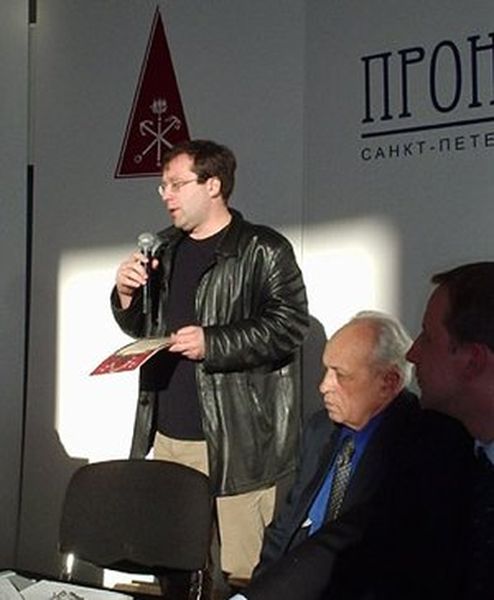
Alexey Dreev delivers his speech at the after-tournament session of the Western Higher League. To his right hand is the arbiter Vladimir Dvorkovich
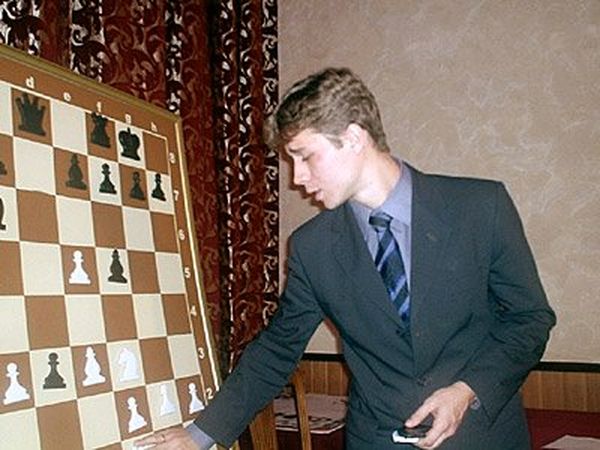
Alexander Motylev comments on the game that he has just won
2004. 1st place at the Tomsk League – A. Motylev with 6.5 out of 9; 1st place at the Saint Petersburg League – A. Dreev with 6.5 out of 9.
2004. Rigorous Selection
The first Women’s Higher League was hosted by the majestic Dagomys. Permanent team players Alexandra Kosteniuk, Tatiana and Nadezhda Kosintseva, Ekaterina Kovalevskaya, Alisa Galliamova, Svetlana Matveeva, the medal winner of the last individual championship Ekaterina Atalik (at the time that the venue was held the fans from Kirov knew her as Katya Polovnikova) and the 2003 champion Irina Turova (who was then awarded a gold medal under her premarital surname Slavina) were exempted from qualification to the Kazan Superfinal. The podium of the strongest women players,who qualified out of the Higher League was less populated than that of men’s, with no more than four players getting their tickets to Kazan. Elena Zaiatz was the best to negotiate all the obstacles of the racing marathon.
2004. Dagomys. 1st place – E. Zaiatz with 7 out of 9.
Elena Zaiatz – the winner of the first Women’s Higher League
2005. Ordeals of Evgeny Bareev
A year later the Russian Chess Federation came to the conclusion that the system of double qualification is only too costly and doesn’t prove itself as the most rational approach. The Western and Eastern Leagues were therefore united into a joint venue, which was then taken over by the capital of the Republic of Tatarstan. The event was off to a sensational start when a heavy tournament favorite Evgeny Bareev, who had to go all the way back to start off from the Higher League once again, was crushed with white pieces by Mikhail Kobalia and seemed to drop out of competing for top places. The Muscovite would later admit that he had failed every previous event in Kazan which he participated in, but the desire to take the top place helped the renowned grandmaster to turn the course of unsuccessful developments around. The final part of the championship turned into a chase of Alexander Khalifman and Bareev after the runaway Sergei Volkov; the final round saw its start hero crowded out into the third position. The Olympiad champions shared the first place, but the additional indicators were in favor of the head of the Children and Youth Committee of the Russian Chess Federation to land him the first place.
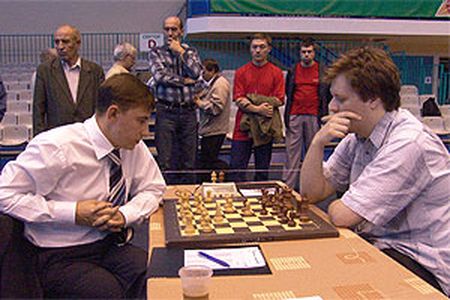
The encounter between Bareev and Bocharov proved to be the key to the first place. The defeat prevented the Siberian from qualifying into the Superfinal
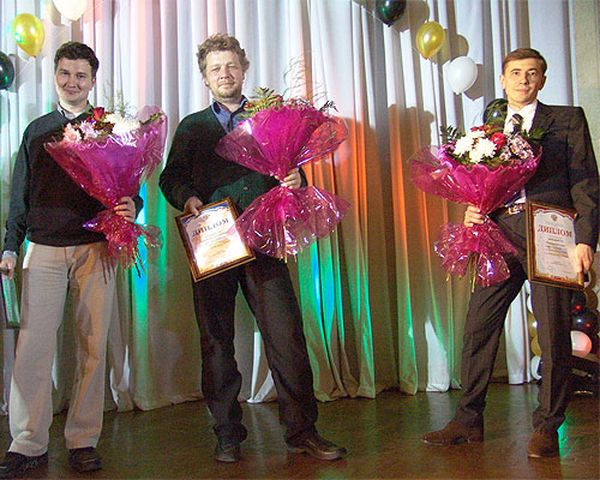
The triumvirate of winners: Sergey Volkov, Alexander Khalifman and Evgeny Bareev
2005. Kazan. 1st place – E. Bareev with 6.5 out of 9 (tied for the first place with A. Khalifman).
2005. Generation Leaders Resume Their Battles
The 2003-2004 Russian Junior Chess Championships were marked by a fierce battle between Natalia Pogonina and Ekaterina Korbut. Having passed into adult chess, Katya and Natasha went on mutual steeplechasing in the Higher League. As a result, Pogonina and Korbut shared the first place, at which point the tie-break came into play. In two previous U-21 Russian Championships the Buchholz would favor Ekaterina, but this time it brought Natalia into the top position. However, a year later Ekaterina Korbut became the champion of the country, shined more than once when playing for the national team, but soon got married (she came to adopt her husband’s surname Sudoplatova) and yet in a couple of years she abandoned chess altogether.
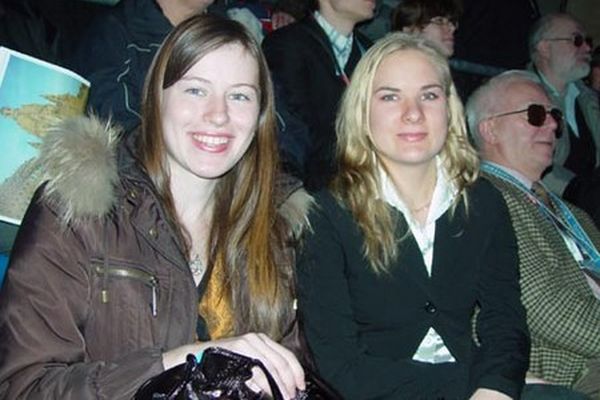
When Buchholz no longer comes into play. Natalia Pogonina and Ekaterina Korbut
2005. Samara. 1st place – N. Pogonina with 6.5 out of 9 (tied for first with E. Korbut)
2006. The Advent of a Younger Generation
In 2006 the Higher League was again accommodated by Tomsk, where the efforts of the distinguished organizer Boris Shaidullin brought about a real chess boom. The Tomsk-400 club would repeatedly win the national team championships, the Cups of Russia would gather strong fields, whereas for one of the main point winners from the squad of Boris Kimovich the next scheduled qualifier tournament would become the lucky one. In Tomsk, the players of the older generations suddenly found themselves dislodged by such young stars as Evgeny Alekseev, Nikita Vitiugov, Sergey Grigoriants, Denis Khismatullin, Ian Nepomniachtchi, and later on, as a result of a very controversial decision adopted by the Russian Chess Federation, this Superfinal list was expanded to include Ildar Khairullin, whose tie-break was worse than Alexey Dreev's.
The sole winner of the tournament was Ernesto Inarkiev, who also didn’t fail to become one of the medal winners of the main event of the Russian Championship.
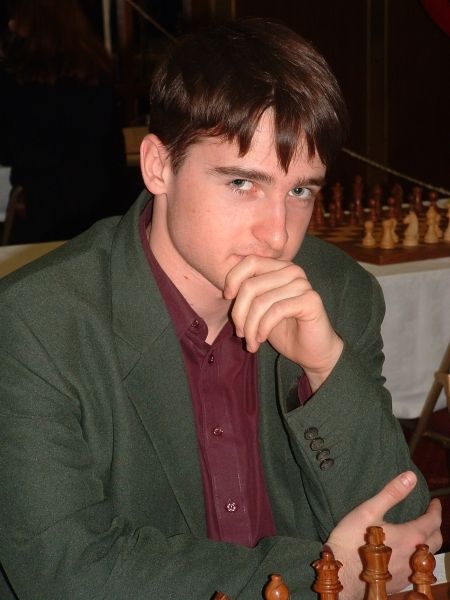
Ernesto Inarkiev was regarded by Tomsk chess fans as a local player
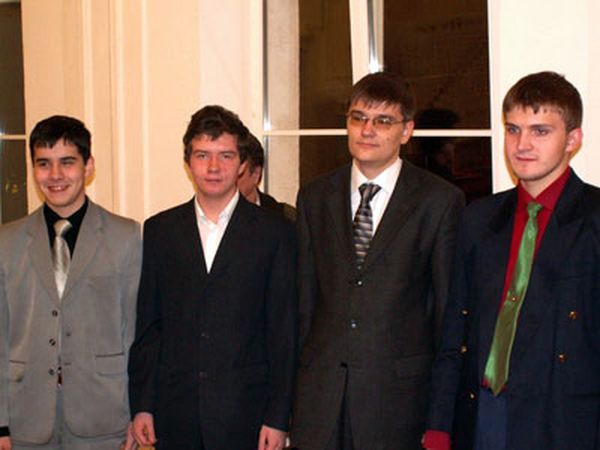
New generation pace setters: Ian Nepomniachtchi, Ildar Khairullin, Evgeny Tomashevsky, and Nikita Vitiugov
2006. Tomsk. 1.E. Inarkiev – 6.5 out of 9.
2006. A Girl from the North
The Higher League that took place in the city of Orel in 2006 demonstrated that the women's chess experiences no shortage of potential candidates into the national team. The battle for the medals that broke out between such rising stars as Valentina Gunina, Elena Tairova and Anastasia Bodnaruk turned out in favor of Valentina, whereas Elena and Anastasia also qualified into the Superfinal.
Who could have imagined back then that this modest and shy Murmansk girl in a sweater would become one of the pillars of the national team?
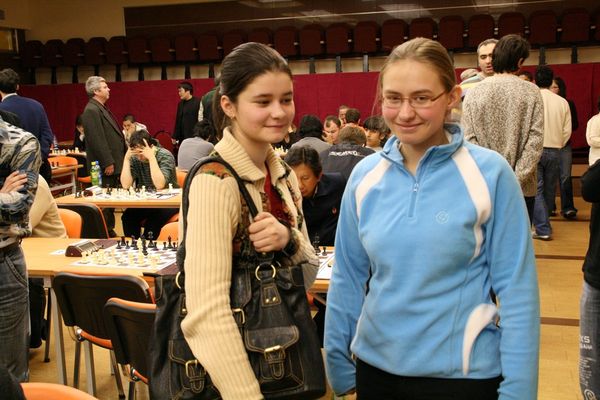
Anastasia Bodnaruk and Elena Tairova also qualified for the Superfinal
2006. Orel. 1st place – V. Gunina with 7 out of 9.
2007. No End of Draws
The outcome of Tomsk-2006 did not seem convincing enough to many chess experts, and in order to combat the element of chance the Krasnoyarsk venue was staged to feature 11 rather than 9 rounds. However, the introduced innovation resulted in quite an opposite effect, and the Higher League got drowned in a sea of short draws. The leaders would not strive to do away with their competitors and rather drifted along the current in the hope of coming across an easier opponent. As a result of such strategy as many as 11 players ended up sharing the first place with the overall result of "+3"! Four of them were left behind the Moscow Superfinal, and it was Nikita Vitiugov who came out first on a superior tie-break.
The main outcome of the Higher League in Krasnoyarsk was the decision adopted by the RCF that for the national championships no draws are allowed prior to move 40 (inclusive) unless agreed so with the tournament arbiter.
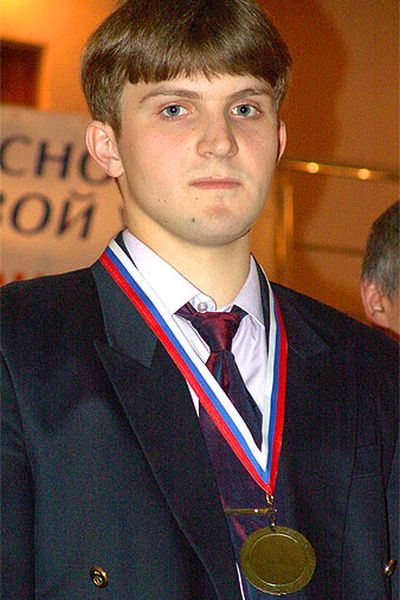
The best tie-break landed Nikita Vitiugov into the first place
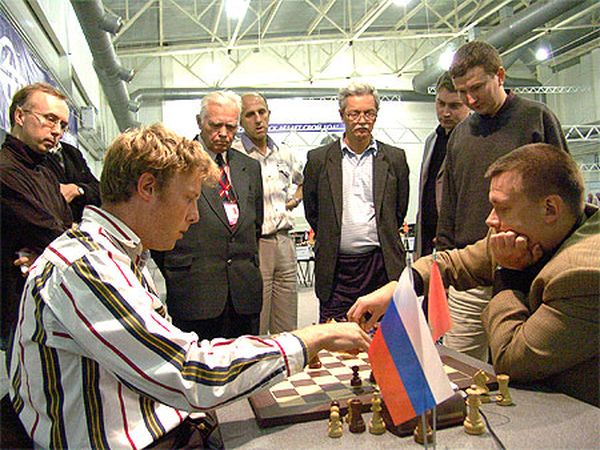
The victory over Pavel Tregubov could have landed Sergey Rublevsky (sitting to the right) into the clear first place, but his opponent succeeded in holding his defensive formations together
2007. Krasnoyarsk. 1st place – N. Vitiugov with 7 out of 11 (tied with A. Rychagov, A. Dreev, F. Amonatov, E. Tomashevsky, A. Timofeev, K. Sakaev – all of them went on to qualify into the Superfinal), P. Tregubov, S. Rublevsky, V. Zvjaginsev and M. Kobalia).
2007. Old Guard is Back
The young generation of chess players was not allowed much time to celebrate their qualification successes. A year later, a remarkable generation of grandmasters, which emerged on the international arena in the early 90s, gave young girls a decisive battle. As a result, the first place was shared among Tatiana Stepovaia, Svetlana Matveeva, and Tatiana Shadrina. The best tie-break gave Tatiana Stepovaia the top spot.
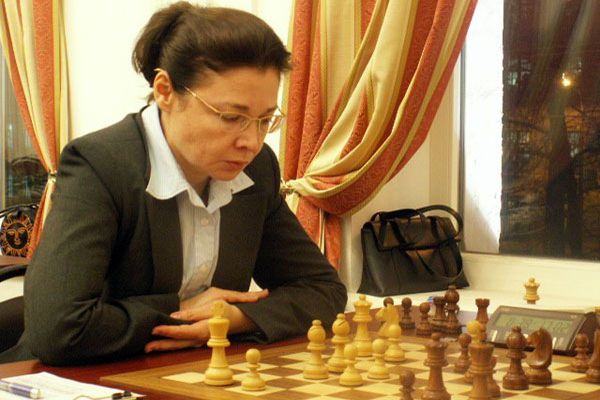
Tatiana Stepovaia – zero nerves and doubts
2007. Smolensk. 1st place – T. Stepovaia with 6.5 out of 9 (tied for first with S. Matveeva and T. Shadrina).
2008. A Step into the Age of Computers
Sometime around 2007-2008 the Russian chess scene was faced off with a so-called cheating – new generation of evil that has been unknown beforehand. Several young players were suspected of getting assistance from the computer software during the game, and the mass media were raging with debates over their alleged implication. The electronic revolution was there for all to see even in the games of fair players. Thus, considerable success in the Higher League in Novokuznetsk was achieved by the Volgograd grandmaster Konstantin Maslak, who managed to become one of the tournament winners. The chess world was abundant with various stories as to Konstantin having at his disposal a special, custom-assembled multi-core computer and making use of all kinds of correspondence and engine databases, which allowed him to be consistent in winning all his opening duels. However, the Kuzbass triumph of the Volgograd native was one of the last in his career as he later went on to abandon the tournament practice. The winner of the next Higher league was Artyom Timofeev, who succeeded in negotiating the tough distance smoothly and without fail.
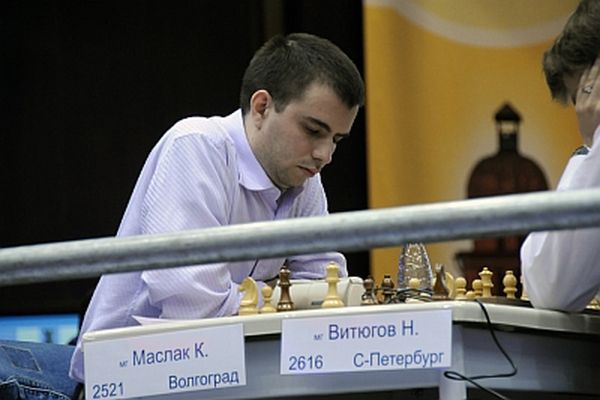
Konstantin Maslak – revelation of the Novokuznetsk-2008
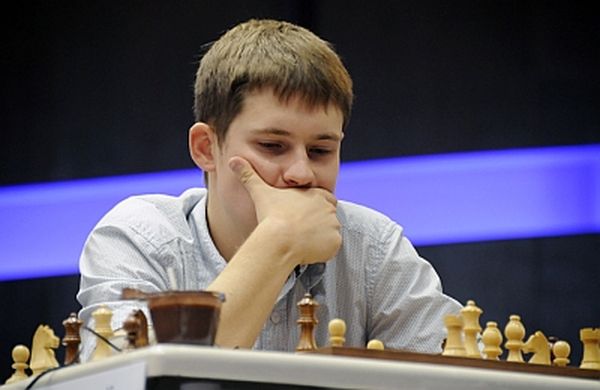
Artyom Timofeev
2008. Novokuznetsk. A. Timofeev with 8 out of 11.
2008. First two-time winner
In 2008 Valentina Gunina was once again faced with the problem of having to qualify for the Superfinal. After the previous year's relative failure, Valya managed to handle the task brilliantly, having given only 1.5 points away to her rivals. Gunina became the first two-time winner of the Russian qualifiers and at the same time achieved a new record for the number of points scored.
This time Valentina was making her way into the Superfinal as one of its favorites
2008. Chelyabinsk. 1st place – V. Gunina with 7.5 out of 9.
2009. One Step Closer to Baikal
The Higher League continued its steady progress towards the eastern parts of the country, and the next event was staged in Ulan-Ude. The capital of Buryatia saw Evgeny Tomashevsky being second to none, and probably one of the most dramatic moments of the struggle was the confrontation between the young talents Ian Nepomniachtchi and Sanan Sjugirov. Sjugirov snatched a victory from his opponent, who had to postpone his ambitious plans for yet another year. It would not be amiss to note that in 2009 the Russian Chess Federation decided to bring down the number of the Superfinal participants from 12 to 10. The number six finisher of Ulan-Ude Alexander Lastin became superfluous as he fell out of favor with Alexander Bach because of the famous Ruy Lopez maneuver Kf3-g5-f3 in his games against Peter Svidler and Alexander Morozevich, forcing his opponents to go for repetition of moves.
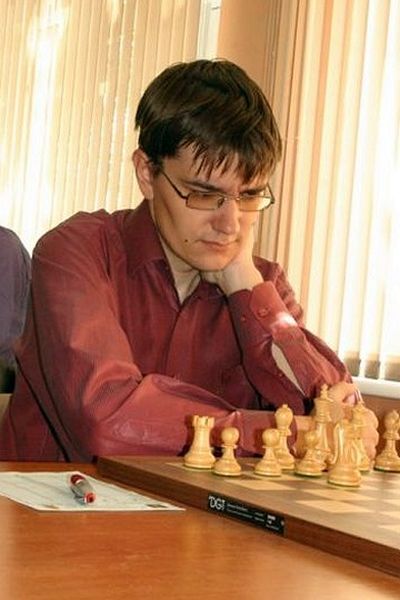
Evgeny Tomashevsky
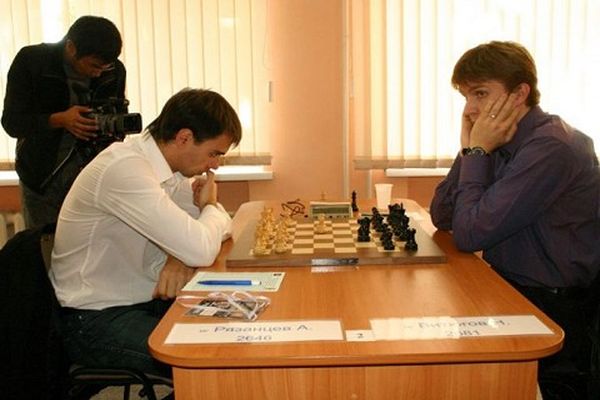
The top three included also Alexander Riazantsev and Nikita Vitiugov
2009. Ulan-Ude. 1st place - E. Tomashevsky with 8 out of 11.
2009. Last battle of Elena Tairova
In the middle of the first decade of the new millennium the sky of the Russian women's chess was illuminated by a newly-born bright star by the name of Elena Tairova. Lena dominated junior competitions, then surely found her way into the Superfinal, where her splashy performance created a furor and immediately granted her membership in the national team. However, in 2008 one of the strongest chess players of Russia quite suddenly discontinued participating in the competitions. The information was scarce, but her fellow chess players regretted to say that Tairova was very ill.
Her return into chess happened in the Voronezh Higher League. Lena started the tournament with five wins in a row and confidently finished it on the first line of the tournament table, repeating the result demonstrated previously by Gunina. It seemed that the worst is entirely over and the Ryazan star would start storming the heights of the Superfinal, but soon the merciless illness would come back...
Valentina Gunina, Elena Tairova and Elena Zaiatz
2009. Voronezh. 1st place – E. Tairova with 7.5 out of 9.
2010. A Springboard for the Champion
In 2010 a shift of power took place in the Russian Chess Federation in Moscow, which resulted in the Gogol Boulevard old guard handing over their authority to the fresh management team headed by Ilya Levitov. The qualifier into the upcoming super final was prepared within tight deadlines and it could not but have its downside effect on the organizational aspect of the tournament as it happened to superimpose on a major economic forum in Irkutsk, which forced the organizers to reduce the fighting distance from 11 to 10 rounds. A brilliant victory in the tournament was achieved by Ian Nepomniachtchi, who later went on to score a no less convincing victory in the Superfinal. One of the biggest successes of his career on the Irkutsk land was also attained by the late Igor Kurnosov, who could have celebrated his next birthday on May 30...
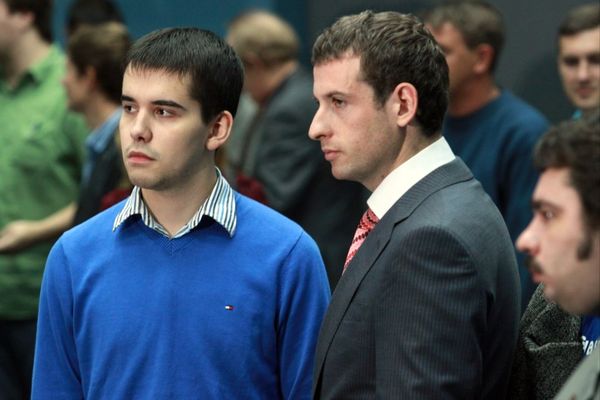
Ian Nepomniachtchi and Ilya Levitov
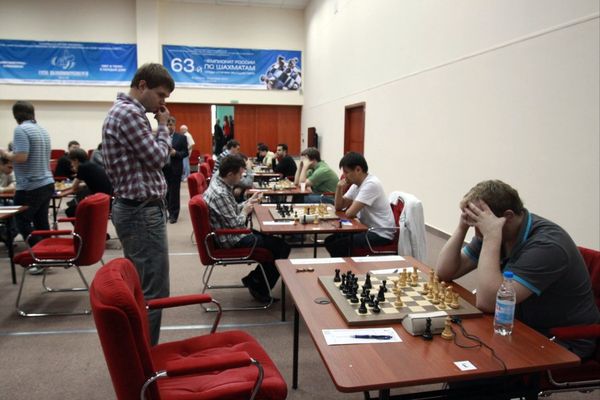
A quick draw against Denis Khismatullin allowed Igor Kurnosov (standing to the left) to secure the coveted ticket into the Superfinal
2010. Irkutsk. 1st place – Ian Nepomniachtchi with 7 out of 10.
2010. The Paikidze Amendment
In St. Petersburg-2010 the assault of a female Olympus was undertaken by Nazi Paikidze – a new student of a famous coach Vladimir Belov. The Moscow tutor had already proved his worth by having shaken the Superfinal through Bodnaruk and Tairova and later he would also assist Goryachkina and Girya, and the performance of Nazi was no exception in a series of these successes. Paikidze ranked first, and was later very close to winning the battle of the strongest. The only downside of Nazi’s ascent was that it created a certain precedent: while been born in Irkutsk and living in Moscow, she still represented Georgia on the FIDE rating list. Some of the officials were outraged, and soon representatives of the foreign federations were banned from participating in the Russian championships.
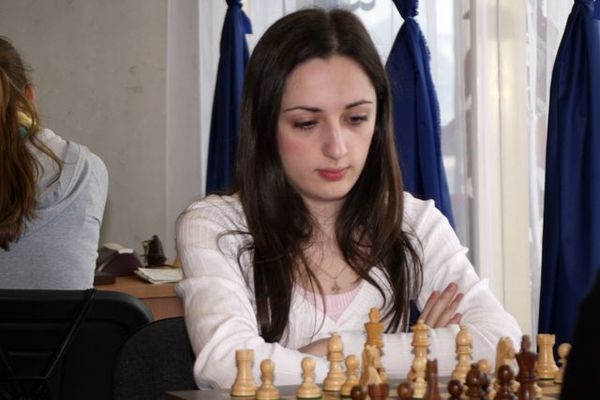
Nazi Paikidze is now studying in the USA and seldom plays chess
2010. Saint Petersburg. 1st place – N. Paikidze with 7 out of 9
2011. The terminator is back
The fate of the Higher League 2011 was in the state of suspension until it became known that the venue would be hosted by Taganrog. The mysterious President of the Rostov Regional Federation Sergey Nesterov, who burst into the Russian chess arena quire spectacularly, went to the unprecedented step: he announced that he would organize both men’s and women’s tournament with bed and board for all participants (prior to that in the women's section of the tournament only top seeds were afforded such kind of a reception). However, the qualifier in Taganrog proved not only the strongest in terms of chess strength of its participants, but also extremely tough. Having decided to step up with the level of entertainment of the Superfinal, Ilya Levitov decided to have the number of the qualification tickets reduced from 5 to 3! Of great interest was the performance of Alexander Morozevich, who made his return to the big chess once again. Initially, the game of Alexander the Great would not pan out as Morozevich made 4 draws in a row, while in most of them he was in danger of losing. But then he followed up with his usual accelerated tempo and managed to win the first place seemingly effortlessly!
Alexander Morozevich is back on track in Taganrog with his habitual level of mighty performance
Although Ernesto Inarkiev’s result was rather modest, one day he became the object of jealousy by the majority of participants of the men's section of the tournamentа
2011. Taganrog. 1st place - A. Morozevich with 8 out of 11.
2011. Equal rights come into force
In 2011, thanks to the goodwill of Nesterov, the Women's Higher League was first held together with the men’s, and soon a similar merger of the two tournaments has become a tradition. The best player in the hometown of Anton Chekhov became Elena Zaiatz, who managed to conquer the Higher League after a 7-year’s break.
Elena Zaiatz is being awarded by the mayor of Taganrog
2011. Taganrog. 1st place – E. Zaiatz with 7.5 out of 9.
2012. The Tyumen Revolution
The Higher League and the Superfinal of 2011 turned out incredibly interesting and exciting, which contributed to the Russian Chess Federation changing its temper justice with mercy, when the qualifier again started to feature as many as 5 qualification tickets into the “heavenly dwelling”. However, not all chess grands profited from reaping the fruits of this timely decision. In the incredible heat that affected Siberia, the Tyumen land witnessed the uprising by players, which prior to the start of the tournament were not regarded as belonging to the group of favorites. The first tables were occupied by Dmitry Frolyanov, Mikhail Panarin, Anton Demchenko and Jaroslav Prizant. The one who was heading the resistance to the high and mighties was the young Daniil Dubov, who was in the lead with one round to go. At the finish Danya could no longer stand the burden of such magnitude and went down being just one step away from becoming the sole triumphant, having been overtaken by the unrelenting pursuers. Additional indicators landed the victory with Dmitry Andreikin, which proved to be only the first step of the Ryazan native towards the victory in the national championship and qualification into the final of the World Cup.
Alas, the Tyumen participants of the Higher League would arrive at the competition at their own expense, although they would later be reimbursed by the RCF.
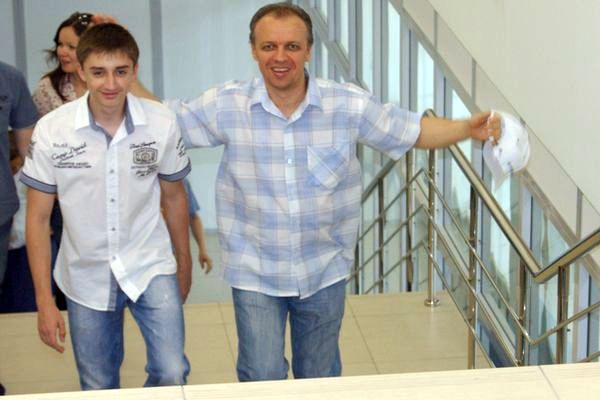
Daniil Dubov with his coach Sergei Shipov are ascending towards yet another height
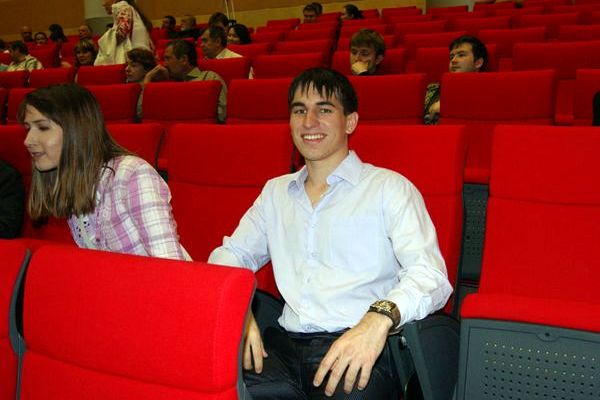
Dmitry Andreikin’s success was rightfully shared by his wife Svetlana
2012. Tyumen. 1st place – D. Andreikin with 7.5 out of 11 (shared with D. Dubov and N. Vitiugov).
2012. The Siberian marathon
In Tyumen, for the first time in the history of women’s qualifiers, the tournament started to feature 11 rounds, which proved a rather difficult challenge (when playing in Taganrog the chess players were provided with additional days off). This time Baira Kovanova prevailed, leaving her friend Natalia Pogonina one point behind. After the tournament the chief coach of the national teams Evgeny Bareev introduced amendments into the Regulation of the Higher League, offering to play in 9 rounds only.
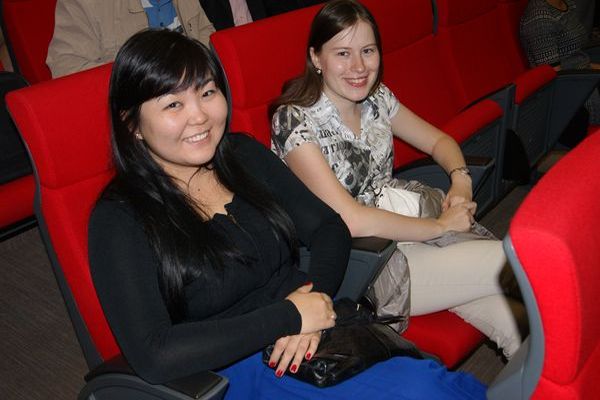
Friends and rivals Baira Kovanova and Natalia Pogonina
2012. Tyumen. 1st place – B. Kovanova with 9 out of 11.
2013. Qualification Ticket Being at Risk of Escaping
As years went by, the line-up of the Higher League would not become stronger because after having cancelled the reimbursement of the entry and accommodation expenses many renowned grandmasters started to withdraw from the prestigious tournament. However, in 2013, the Russian chess community was shocked by the unexpected news. In order to return the former popularity to the Higher League, the RCF Board went for an interesting experiment and announced that the winner of the qualification in Yekaterinburg would not only pass into the Superfinal and get a solid prize, but would also be entitled to participate in the Tal Memorial. This bold move nearly ended up in a rather tricky situation: in the middle of the tournament the lead was taken over by Anton Shomoev and Aleksey Goganov, the latter of the two was not even a grandmaster at the time. The fate of the "Tal" ticket could have been decided in the penultimate round in the internecine struggle of the two national heroes. Shomoev was close to winning both in the game and in the Higher League, but a draw, combined with the defeat in the last round from Nepomniachtchi dropped him as low as the fifth place. Ernesto Inarkiev won the event to become the first man who managed to win the Higher League twice.
The chess world was in anticipation whether Anton Shomoev would get a ticket into the Tal Memorial
Ernesto Inarkiev became the two-time winner of the Higher Leagues and would finally participate in the Petrosian rather than in the Tal Memorial
2013. Yekaterinburg. 1st place – E. Inarkiev with 6.5 out of 9 (shared with I. Nepomniachtchi).
2013. Crowding out the elder generation
Another women's battle was marked by another advent of youth in its full power. Landslide victory in the tournament was scored by Anastasia Bodnaruk, while the second place was shared by such perspective chess players as Alina Kashlinskaya and Alexandra Goryachkina. The elder generation began to slowly drop out of the Higher Leagues under the unrelenting pressure of the youth...
Anastasia Bodnaruk prevailed in the Urals
Alexandra Goryachkina together with her farther
2013. Yekaterinburg. 1st place – A.Bodnaruk with 7.5 out of 9.
2014. Success in the Far East
It makes no secret that the popularity and prestige of the Russian qualification began to flag over time. Entry and accommodation fees of the event were not subject to reimbursement, and the leading players would often come to rate the team championships of foreign countries or strong opens higher than the Higher League. However, in 2014 a businessman Andrei Filatov became President of the Russian Chess Federation. He was the author of the project "Chess in the Museums", which, in particular, was carried out in the course of the Russian Superfinals. The new team, headed by the Executive Director of the RCF Mark Glukhovsky and the senior national teams coach Sergey Yanovsky took decisive steps in the direction of rescuing the Higher League. The prize fund of the competition started to grow, the bed and board for the qualified participants, which had been canceled a few years ago, was reinstated.
The Higher League 2014 was held in the Far East, and ended up in the first place being shared between Igor Lysyj, Dmitry Jakovenko and Vadim Zvjaginsev, when the tie-break landed the victory with Igor, who later went on to excel in the Superfinal. It should be noted that the competition was led for a long time by the young Vladimir Fedoseev, but at the finish the native of St. Petersburg failed to Zvjaginsev and fell short of the "Super".
The winner of the Higher League and the Champion of Russia Igor Lysyj
2014. Vladivostok. 1st place – I. Lysyj with 6.5 out of 9 (shared first with D. Jakovenko and V. Zvjaginsev).
2014. The Crimean Debut
The Women's Higher League in Vladivostok was noted by a number of interesting events. For example, the Crimean Oksana Gritsaeva managed to qualify into the Superfinal. Requalified for the next stage were the young Alexandra Goryachkina and the seasoned Ekaterina Kovalevskaya, whereas the first place was shared between Olga Girya and Alina Kashlinskaya. Upon counting of the tie-break Olga was declared a winner.
Olga Girya – current champion of the Higher League
Oksana Gritsaeva – chief newsmaker of the Vladivostok tournament
2014. Vladivostok. 1st place – O.Girya with 7.5 out of 9 (shared first place with A. Kashlinskaya).
Pictures by: Evgeny Atarov, Ilya Odessky, Pavel Sirotin, Mikhail Savinov, Andrey Paneyakh, Anna Burtasova, Eteri Kublashvili, Vladimir Barsky, Dmitry Kryakvin, as well as from websites chessbase.com and chesspro.ru.









